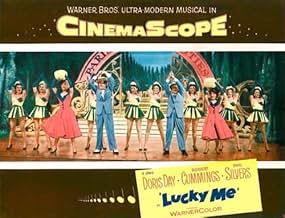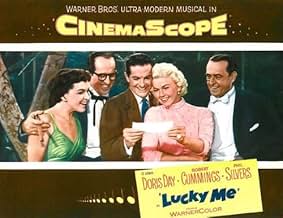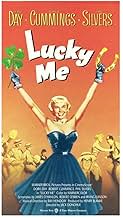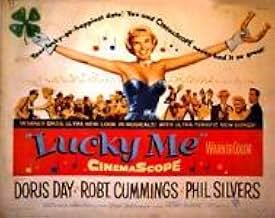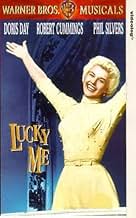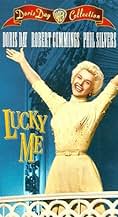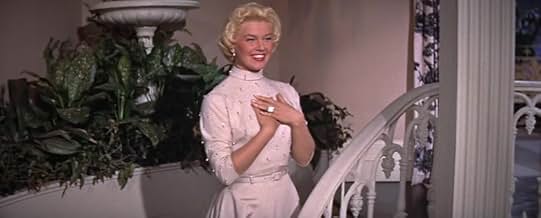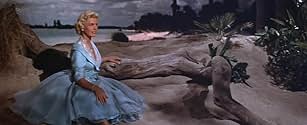Füge eine Handlung in deiner Sprache hinzuThree struggling theatrical performers meet a famous songwriter who is trying to convince a wealthy oilman to finance a musical he is scripting, promising them stardom if it comes to fruitio... Alles lesenThree struggling theatrical performers meet a famous songwriter who is trying to convince a wealthy oilman to finance a musical he is scripting, promising them stardom if it comes to fruition.Three struggling theatrical performers meet a famous songwriter who is trying to convince a wealthy oilman to finance a musical he is scripting, promising them stardom if it comes to fruition.
Bebe Allen
- Restaurant Patron
- (Nicht genannt)
Leon Alton
- Man at Ladder
- (Nicht genannt)
John Alvin
- Clerk
- (Nicht genannt)
William Bakewell
- Jaguar Owner
- (Nicht genannt)
Jack Boyle Jr.
- Call Boy
- (Nicht genannt)
Paul Bradley
- Diner
- (Nicht genannt)
- …
Charles Cane
- Sergeant
- (Nicht genannt)
Steve Carruthers
- Club Patron
- (Nicht genannt)
Empfohlene Bewertungen
Fairly expensive Warners musical, the then-novelties of which are a) CinemaScope and b) location filming in Miami, which does look '50s-luscious. These are tied to a very tired screenplay about superstitious Doris Day and her pals Phil Silvers, Nancy Walker, and Eddie Foy Jr. going from revue work to kitchen work to Broadway, courtesy of songwriter Robert Cummings, whose songs all sound like second-rate Sammy Fain and Paul Francis Webster. Much talent that had just turned out "Calamity Jane"--Day, Webster, Fain, choreographer (and here director) Jack Donohue, screenwriter James O'Hanlon--worked on this one, but it's nobody's best work, though Doris is as spirited and golden-voiced as ever, and you don't really want to see her end up romantically with someone as uninteresting as Robert Cummings. Silvers and Walker certainly deserved better material, and Donohue doesn't know how to pace a plot, even one as fragile as this. Martha Hyer is another casualty, overplaying Cummings' shrew of a girlfriend, and the other supporting players are no-name. It's worth sitting through once for a couple of nicely staged numbers (especially the opening) and some alluring glimpses of Florida, but it's the Warners musical at its most labored and uninspired.
I thought LUCKY ME from Warner Bros in 1954 was not the first Cinemascope musical as some comment says.. possibly the 1953 FOX musical ? HOW TO MARRY A MILLIONAIRE. Fox patented Cinemascope and hired the process to other studios. The first WBs musical was A STAR IS BORN. But I might be wrong... anyone?
On my Australian market DVD this really silly Doris Day musical has opening credits in cinemascope and the rest of he film in ..horror of horrors! pan and scan TV presentation. On the box it says hooray for Cinemascope but the film itself is not in Cinemascope if anyone from WB DVD office bothers to check. The color and art design is terrific, the musical numbers well staged (as I could tell, as I only saw half of the image), the 50s style and modernity snazzy and Doris Day was beautiful. Its trite script is embarrassing ... a bit like any of the Columbia musicals with Jack Lemmon or Betty Grable of the same year. I was keen to enjoy but the badly presented cropping, down to TV from cinemascope ruined the experience... so I took the DVD back to the store, complained to the bemused 19 year old goth chick behind the counter and got a refund. She seemed to spark to life when I pretended to be interested in a box set of BUFFY Vampire Slayer, but I tricked her and took the money instead.
On my Australian market DVD this really silly Doris Day musical has opening credits in cinemascope and the rest of he film in ..horror of horrors! pan and scan TV presentation. On the box it says hooray for Cinemascope but the film itself is not in Cinemascope if anyone from WB DVD office bothers to check. The color and art design is terrific, the musical numbers well staged (as I could tell, as I only saw half of the image), the 50s style and modernity snazzy and Doris Day was beautiful. Its trite script is embarrassing ... a bit like any of the Columbia musicals with Jack Lemmon or Betty Grable of the same year. I was keen to enjoy but the badly presented cropping, down to TV from cinemascope ruined the experience... so I took the DVD back to the store, complained to the bemused 19 year old goth chick behind the counter and got a refund. She seemed to spark to life when I pretended to be interested in a box set of BUFFY Vampire Slayer, but I tricked her and took the money instead.
The first time I saw this film I was distracted for a few minutes and missed the intro credits. Being in a lazy mood I just sat down to watch and if it hadn't been for the setting (Miami) and the star (Doris), I'd have sworn this were one of the early MGM CinemaScope films, since someone was obviously emulating a certain kind of Arthur Freed approach. But while elaborate visually at times, no, it was Warner Bros., but for what it was, not bad. In fact, the only real debit I can make against LUCKY ME remains its very conventional and predictable plot conventions. That, and the one-note roles of Phil Silvers (a ham) and Robert Cummings (handsome but bland nice guy). Songs? Okay, nothing special, perhaps, but serviceable. So for anyone who simply wants an old, spiffy if brainless musical, they still can't go wrong here, even if someone like Howard Keel might have brought more to the Cummings role (for better and worse).
As for the film process itself, did this film really need such elaboration? Probably not, but Scope does continue to lend it a certain novelty.
As for the film process itself, did this film really need such elaboration? Probably not, but Scope does continue to lend it a certain novelty.
LUCKY ME is a prettily Technicolored musical outing from Warner Bros., one that DORIS DAY was obligated to make because of arrangements made by her producer hubby. She should have stuck to her guns and refused to do the film, which doesn't do much for anyone--including its talented supporting cast--ROBERT CUMMINGS, PHIL SILVERS, NANCY WALKER, MARTHA HYER and EDDIE FOY, JR.
Day is the singer in a team of stranded players working in the kitchen of a fancy Miami hotel because of a prank played by the obnoxious PHIL SILVERS, whose strident comedy technique is overworked here.
When ROBERT CUMMINGS needs a singer for his upcoming Broadway show, he discovers Doris can sing and from then on he and his girlfriend (MARTHA HYER) squabble over her dad's backing for the show and his interest in Doris. That's all there is to the plot.
Songs by Sammy Fain and Paul Webster have been tacked onto this slight story with less than impressive results. Only one ballad--done as a dream sequence--has any real worth and it's a beauty called "I Speak to the Stars" which is the only genuine first class song in the movie. A catchy first number, "The Superstition Song," at least gets some interest for the way Doris Day manages to sing it through a lengthy opening sequence.
If you're a Doris Day completist and must see all her films--well, that's the only reason for catching up with this one. It's a dud--a real dud. Trite and unfunny as can be.
Day is the singer in a team of stranded players working in the kitchen of a fancy Miami hotel because of a prank played by the obnoxious PHIL SILVERS, whose strident comedy technique is overworked here.
When ROBERT CUMMINGS needs a singer for his upcoming Broadway show, he discovers Doris can sing and from then on he and his girlfriend (MARTHA HYER) squabble over her dad's backing for the show and his interest in Doris. That's all there is to the plot.
Songs by Sammy Fain and Paul Webster have been tacked onto this slight story with less than impressive results. Only one ballad--done as a dream sequence--has any real worth and it's a beauty called "I Speak to the Stars" which is the only genuine first class song in the movie. A catchy first number, "The Superstition Song," at least gets some interest for the way Doris Day manages to sing it through a lengthy opening sequence.
If you're a Doris Day completist and must see all her films--well, that's the only reason for catching up with this one. It's a dud--a real dud. Trite and unfunny as can be.
"Lucky Me" was the first musical to be shot in the then, new process, CinemaScope. It was also a picture that Doris Day, Hollywood's Golden Girl, did NOT want to make.
Because of contractual obligations, she decided to do the film and to give it 110% of herself in the role of 'Candy Williams'. Her co-star was Robert Cummings, long-time Hollywood leading man and television star. In support, she had Phil Silvers, Nancy Walker, who later gained fame as Ida Morgenstern in "Rhoda", and Eddie Foy, Jr.
It was reported that Martha Hyer, a blond, was forced to dye her hair red so as not to conflict with the star, Miss Day.
This film is famous for another reason. Judy Garland was on the Warner Brothers lot filming "A Star is Born". She and Miss Day visited each other's sets and became friends.
"Lucky Me" is a fun musical which opens with Doris Day's dynamite opening number, "The Superstition Song," which she sings while bouncing down the streets of Miami! A TRUE STAR PERFORMANCE! Only Doris could have gotten away with this, and she was brilliant.
She played Candy Williams, a singer/actress who was appearing in a travelling show, "Parisian Pretties" which bombed in Miami. Standed, she meets a New York songwriter, Cummings, who is casting a new Broadway show. He pretends to be someone else to court Candy, but falls in love with her.
During the proceedings, Doris Day sings most of the numbers including her chart hit, "I Speak to the Stars". The highlight is "I Wanna Sing Like an Angel" and "Love You, Dearly," a lovely ballad which should have been a hit.
Phil Sivers was wonderful and had a great number with Day called "Men!" The other actors gave Miss Day able support and everyone seemed to work well with each other.
Angie Dickinson made her film debut in a walk-on scene at the big party, but you probably won't recognize her (she had black hair). Bill Goodwin played the same role he played in many a film at various studios.
Again, Doris Day fans will just love seeing their favorite star do ANYthing. Even though Miss Day didn't like the picture, her fans seem to love every minute of it. I must admit, I liked it!
Because of contractual obligations, she decided to do the film and to give it 110% of herself in the role of 'Candy Williams'. Her co-star was Robert Cummings, long-time Hollywood leading man and television star. In support, she had Phil Silvers, Nancy Walker, who later gained fame as Ida Morgenstern in "Rhoda", and Eddie Foy, Jr.
It was reported that Martha Hyer, a blond, was forced to dye her hair red so as not to conflict with the star, Miss Day.
This film is famous for another reason. Judy Garland was on the Warner Brothers lot filming "A Star is Born". She and Miss Day visited each other's sets and became friends.
"Lucky Me" is a fun musical which opens with Doris Day's dynamite opening number, "The Superstition Song," which she sings while bouncing down the streets of Miami! A TRUE STAR PERFORMANCE! Only Doris could have gotten away with this, and she was brilliant.
She played Candy Williams, a singer/actress who was appearing in a travelling show, "Parisian Pretties" which bombed in Miami. Standed, she meets a New York songwriter, Cummings, who is casting a new Broadway show. He pretends to be someone else to court Candy, but falls in love with her.
During the proceedings, Doris Day sings most of the numbers including her chart hit, "I Speak to the Stars". The highlight is "I Wanna Sing Like an Angel" and "Love You, Dearly," a lovely ballad which should have been a hit.
Phil Sivers was wonderful and had a great number with Day called "Men!" The other actors gave Miss Day able support and everyone seemed to work well with each other.
Angie Dickinson made her film debut in a walk-on scene at the big party, but you probably won't recognize her (she had black hair). Bill Goodwin played the same role he played in many a film at various studios.
Again, Doris Day fans will just love seeing their favorite star do ANYthing. Even though Miss Day didn't like the picture, her fans seem to love every minute of it. I must admit, I liked it!
Wusstest du schon
- WissenswertesIn her autobiography, Doris Day reported that she was suffering from nervous exhaustion following the strenuous production schedule for "Calamity Jane" (1953) and did not feel sturdy enough to begin work on "Lucky Me" (1954). When her husband-manager Martin Melcher and Warner Bros. strong-armed her into moving forward, she suffered what she termed a "nervous breakdown" during filming.
- Zitate
Candy Williams: There's 13 people in the audience.
Hap Schneider: This is no time to be superstitious. It's bad luck.
- VerbindungenReferences Die siebente Nacht (1954)
Top-Auswahl
Melde dich zum Bewerten an und greife auf die Watchlist für personalisierte Empfehlungen zu.
- How long is Lucky Me?Powered by Alexa
Details
- Laufzeit
- 1 Std. 40 Min.(100 min)
- Seitenverhältnis
- 2.55 : 1
Zu dieser Seite beitragen
Bearbeitung vorschlagen oder fehlenden Inhalt hinzufügen


